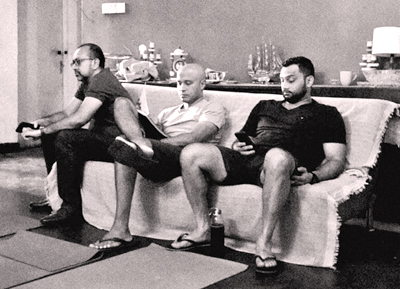This trend is unfortunate in the Sri Lankan art scene, where success in portraying one character often results in being repeatedly cast in similar roles by different directors. It poses a definite disadvantage for an artist eager to breathe life into a diverse range of characters
Bimsara Premaratna, a luminous soul, graces diverse areas as an actress, voice artist, a host and a director — painting her essence across the canvas of theatre, silver screen and beyond.
Her journey began notably with the Silent Hands production “Move Over Mrs. Markham” in 2009, and since then, she’s embraced diverse roles such as “Blanche” in Tennessee Williams’ “Streetcar Named Desire” with the Workshop Players, “Tupolski” in Martin McDonagh’s “Pillowman” with Stage Light & Magic, and “Wathsala” in Rajitha Dissanayake’s “Nethuwa Bari Minihek” with the Freedom Theatre Group, where she earned recognition as Best Supporting Actress at the State Drama Festival 2017.
 We are familiar with her deep, husky voice from TV, as it has become indispensable in the commercial industry.
We are familiar with her deep, husky voice from TV, as it has become indispensable in the commercial industry.
Her talent extends to film as well, portraying characters like “Kanthi” in Sumathy Sivamohan’s “Puththu Saha Piyawaru” (Sons and Fathers), Eunice Peiris in Chandran Rutnam’s “According to Mathew,”and earning acclaim as “Mother” in Nilmini Perera’s “Two Months,” for which she received the Outstanding Performance award at the Women’s International Film Festival.
Not limiting herself to acting, recently Bimsara has also ventured into directing and producing, with her directorial debut, Tracy Letts’ “August Osage County,” currently staged at the Lionel Wendt Colombo, with the final show tonight at 7 pm.
A few days before the premiere of ‘August: Osage County,’ Bimsara shared with Youth Observer her insights into her multifaceted career and approach to living a quality, slow-paced life. She chooses the best for her career as well as for life without a hurry amidst the frenzy of the ‘new normal,’ where the noise of social media often pressures individuals to make their presence known, without succumbing to feelings of inadequacy or exclusion.
In the conversation, Bimsara explained her motivation for embracing multifaceted roles within the art scene. She expressed that her diverse involvement stems from a deep-seated drive to continually seek knowledge and novelty, remaining consistently hungry for new experiences and insights, which fuels her passion for pushing artistic boundaries and embracing varied roles.
“I enjoy performing. There may be some talent involved, but more than that, it’s an area of fascination for me. I like immersing myself in it and trying different things, experimenting with new styles and techniques. Even if I have a preference for a particular style of theater, I’m always open to and curious about trying something different. Perhaps next time I’ll explore puppetry or delve into dance theater. I constantly seek to evolve and challenge myself as a performer and artist.” she said.
Bilingual capacity
The specialty in Bimsara’s artistic career is her bilingual capability. Bimsara effortlessly moves between languages to tell stories, crossing linguistic boundaries with ease which is not something common in the Sri Lankan art scene. “Performing is about telling the story, regardless of the language,” she said.
“I really enjoy the fact that I don’t focus too much on the language itself, whether I’m performing in English or in German. For me, it’s about the performance and storytelling, immersing myself in the experience. So if I need to learn a new language to perform, I’ll gladly do so. This approach has allowed me to seamlessly navigate various mediums, including the Sinhala-speaking industry, and transition between them with ease. I believe more people should adopt this fluid approach. Bimsara acknowledges. “But now, the landscape is evolving, and I’ve noticed shifts in the industry too. When I first started, there might have only been one or two individuals like myself. However, now I see a growing number, which is fantastic,” she said.
Transformative vehicle

Rehearsals of AOC
Beyond personal growth, Bimsara views performance as a transformative vehicle for individuals overcoming language barriers and other challenges. “If you’re fearful of language or lack exposure, overcoming that block can be effectively achieved through performance. This is particularly evident with children, where even those with speech or learning difficulties, as well as those with limited English proficiency, can thrive in a performing environment. Through this experience, individuals can conquer their fear of language.” she notes.
Yet, Bimsara emphasizes the reciprocal nature of cultural exchange. “There’s a wealth of experiences to draw from globally,” she remarks. “By embracing diverse influences and sharing our work internationally, we enrich our artistic landscape.”
When asked which aspect she enjoys the most out of the various areas she is juggling with, Bimsara’s response was intriguing. “That’s a question I don’t really know how to answer,” she said. “Mostly because, if I’m in the middle of doing something, then that is the most interesting thing to me at that time.” She emphasizes her tendency for full immersion, often at the expense of other pursuits. “I tend to shut down from a lot of other things at that time,” she explained. “For example, for the past a few months I have been working on this play. When I immerse myself in that, I find myself declining other opportunities, whether it’s a new project or a film or a teledrama, because that’s the way I know how to work. I’m not great at multitasking.”
Typecast
Although Bimsara has had the opportunity to work with a diverse spectrum of art, the characters she has been assigned have somewhat limited her capacity. She has been often typecast, playing roles that resemble her own middle-class, calm, and quiet demeanor. This trend is unfortunate in the Sri Lankan art scene, where success in portraying one character often results in being repeatedly cast in similar roles by different directors. It poses a definite disadvantage for an artist eager to breathe life into a diverse range of characters.
Bimsara reflects on the challenges of being typecast in the acting industry. “I’m conscious of it,” she admits. “There’s a perception that as an actor, you might have limits to yourself also.” She acknowledges the tendency of directors to pigeonhole actors based on their perceived persona. “When a lot of directors are casting, they tend to look at you as you are and then fit you in,” she explains. “Sometimes they go as far as to say, ‘I am writing a character now, which is exactly like you. So just come and appear.’”
Despite this, Bimsara believes in her versatility as an actor. “I’d like to think I’m more capable of being something different to who I am or what I’m like,” she asserts. “In fact, I have.” She cites examples of playing vastly different roles, such as a rural, downtrodden mother in the short film “Two Months” and the character Lucy in “Men Without Shadows,” which she describes as “quite a different and challenging character.”
While she understands the convenience of casting actors who align with the character’s traits, she sees it as a waste of training and potential. “It’s a waste of the amount of time and effort that you put if you just want to be like yourself,” she said.
Quality, slow-pace life
Bimsara, an ambivert, enjoys her celebrity status, enjoying socializing and being amidst others, but equally cherishes her alone time for rejuvenation. Over the past decade, the world has undergone drastic changes with the proliferation of social media. Now, one must make noise to affirm their relevance, or risk being forgotten amidst the daily influx of new faces vying for the spotlight. Bimsara remains mindful of the shifting landscape. She finds solace in a life of quality, avoiding the frenetic pace of social media for a quieter, drama-free existence.
 “I’m a quiet person,” she reflects, “like my personality is that I’m not about like a lot of noise. I don’t like making a lot of noise, and I’m an ambivert. I can, where needed, be loud and noisy, and even glamorous or showy, but what I’m comfortable with is to be in my corner and do the work.”
“I’m a quiet person,” she reflects, “like my personality is that I’m not about like a lot of noise. I don’t like making a lot of noise, and I’m an ambivert. I can, where needed, be loud and noisy, and even glamorous or showy, but what I’m comfortable with is to be in my corner and do the work.”
Rather than conforming to societal expectations, she directs her energies towards personal growth and learning. “I’d rather focus my energies and efforts on growing, on learning, on things that I can challenge myself to do better, or to share what I do well with other people.”
As a drama coach, she finds fulfillment in sharing her expertise with fellow actors. “The work that I do in the school as a drama coach is something I’ve grown to really value. The work that I do, sharing my work with other actors in very informal settings. I’m constantly doing that.”
Her engagement with social media is pragmatic. “I’m not after followers, and I’m not after playing to an audience. It’s more of a sharing platform, it’s more of a networking platform.”
While acknowledging the economic aspect of social media, she remains steadfast in her approach. “I don’t make a value judgment on the people who do…it’s just not me.”
Bimsara’s stance reflects a deliberate choice to navigate the complexities of postmodern context while staying true to herself and her values.
August Osage County
Speaking about her latest directorial endeavors with ‘August Osage County’ by Tracy Letts, Bimsara remarked, “It’s originally a play written in 2007 as a playwright and it won the Pulitzer Prize for the script for the play in 2008. Then in 2008, they had the Broadway production. The Broadway production also won many Tony Awards. In 2013, the same script writer wrote the screenplay, and there was a film adaptation which gained popularity due to the stellar cast including Meryl Streep and Julia Roberts. The play version has traveled to many countries. There has been an Indian production, a Turkish production, and everywhere they have done it in English.”
Regarding the selection of this particular play as her debut directorial work, Bimsara explained, “The play spoke to me, rather the play found me more than I found the play. I watched the film first in 2014 and was blown away by it. Then, a friend of mine bought the script while traveling in New York and gave it to me. When I read the play, that really floored me.”
It was quite an ordeal for Bimsara to bring the play to the stage. Her initial attempt in 2018 involved starting pre-production work and securing the necessary rights. However, soon after, a series of tumultuous events unfolded both within the country and globally, adversely affecting her plans.”This is third time lucky, and again, no regrets with any of that because if things happen, they are meant to happen.”
Discussing the thematic relevance of the play, Bimsara noted, “The play talks about generational trauma and certain race elements are discussed quite strongly. The relationship between parents and children may shock audiences, but it’s very relatable. It’s a lot of relatable with a lot of harsh truths but it’s also quite comically presented.”
In conclusion, Bimsara expressed her excitement about the audience’s reception, stating, “I’m very excited to see how the audience would take it.”
Pix: Malan Karunarathne









